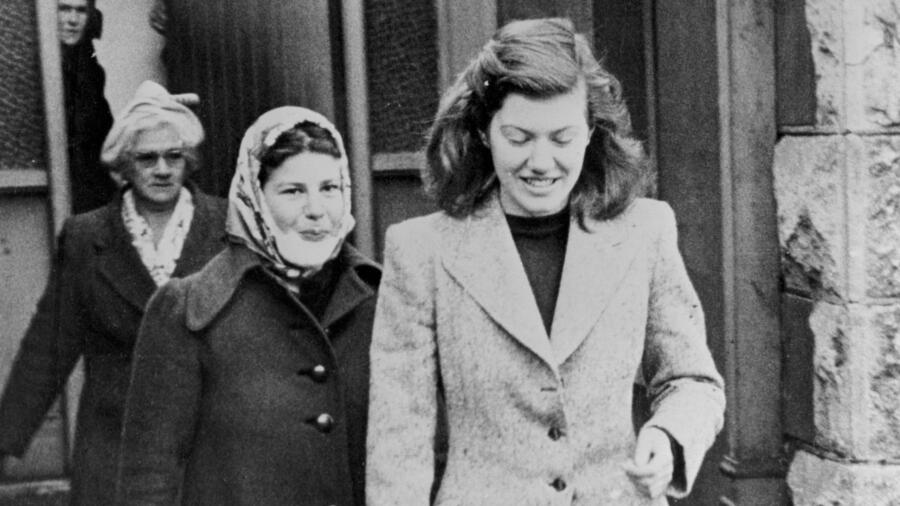
In 2013, Shelia Eddy tweeted a seemingly heartfelt message to her best friend Skylar Neese: "Rest easy Skylar, you’ll ALWAYS be my best friend." Little did her Twitter followers know that Eddy, along with another friend, Rachel Shoaf, were the perpetrators behind Neese's brutal stabbing death, meticulously planning the crime in their science class. The chilling incident echoed a pattern seen in 2012, 1985, and 1954, where seemingly inseparable best friends turned into murderers.
While cases of "Best Friend Forever" (BFF) killers capture media attention for their sensational nature, they are not the most common. According to Apryl Alexander, an associate professor at the University of Denver, approximately 30 percent of juvenile murders involve a co-defendant. These cases often stem from shared problems, such as social isolation and familial difficulties, bonding troubled youths who may lack extended friend groups.
Studies, including those cited by the National Institute for Health, suggest that exposure to violence at home or in the community significantly increases the risk of teens engaging in violent behavior. Criminal psychologists argue that the malleability of the teenage brain, coupled with peer influence, contributes to these crimes.
Apryl Alexander emphasizes the role of mental health concerns and diagnoses in juvenile crime. In 2020, she received a federal grant to establish a trauma treatment program for justice-involved girls, as 90 percent of them have a history of trauma.
The question arises: could early awareness and treatment of trauma prevent these girls from entering the criminal legal system? Below, we explore the stories of five BFF pairs who did enter the criminal legal system, examining where they are today.
Pauline Parker And Juliet Hulme
The 1994 film "Heavenly Creatures," featuring Melanie Lynskey and Kate Winslet, drew inspiration from the real-life story of Pauline Parker and Juliet Hulme, a pair of 16 and 15-year-old friends from New Zealand. Their deep bond and elaborate fantasy life, coupled with a perceived unhealthy obsession with each other, raised concerns among their parents. Both girls, having experienced traumatic medical conditions and lacking other friendships, developed an intense connection.
When Parker's mother, Honora, opposed their plan to move away together in 1954, the girls resorted to a brutal act, using a brick in a stocking to bludgeon Honora to death. Despite their plea of insanity being rejected, Parker and Hulme were declared "incurably bad" rather than "incurably insane" during their murder trial. Consequently, they received an "indefinite imprisonment" sentence but served only five years. A crucial condition of their release was never to see each other again.
Following their release, Parker pursued a career as a librarian and later became a children's horseback riding instructor. In contrast, Hulme, who adopted the name Anne Perry, achieved recognition as a New York Timesbestselling author specializing in historical detective fiction.
In a 2003 interview with The Guardian, Perry expressed frustration, questioning why she couldn't be judged for her present self rather than her past actions. Despite facing challenges during her imprisonment, including three months in a rat-infested solitary confinement cell, Perry attributed her redemption to the experience. Embracing devout Mormonism, she stated, "It was there that I went down on my knees and repented. That is how I survived my time while others cracked up. I seemed to be the only one saying, I am guilty, and I am where I should be."
Karen Severson And Laura Doyle
In 1985, the dark tale unfolded as California girls Karen Severson and Laura Doyle took the life of 17-year-old Michele "Missy" Avila. The motive behind the chilling act was Avila's alleged involvement with Doyle's boyfriend. The duo drowned Avila by holding her head down in a shallow stream in Big Tujunga Canyon, located in Angeles National Forest.
In a disturbing twist, Severson and Doyle attended Avila's funeral, posing as supportive friends while even suggesting potential suspects. They maintained this facade for three years before the truth emerged. Convicted at the age of 22, both Severson and Doyle received a sentence of 15 years to life in an adult prison.
After serving 21 and 22 years, respectively, for second-degree murder, Severson and Doyle were granted parole. In 2015, Severson, who had known Avila since the age of seven, controversially claimed that the act was accidental, stating, "I only wanted to torment Missy."
Following their release, Doyle chose to remain relatively under the radar, while Severson took a different path by writing a memoir about the crime. During the promotion of her e-book, Severson, who perceives herself as a reformed bully, seemed to shift blame onto Avila, stating, "All this stuff, everything we were accusing her of, she knew she did it, but not one time did she say she's sorry!"
Shelia Eddy And Rachel Shoaf
In the early hours of July 6, 2012, Skylar Neese, a teenager from West Virginia, clandestinely left her parent's home to meet her friends, Shelia Eddy and Rachel Shoaf. The trio ventured into the woods under the guise of smoking marijuana, but instead, Neese fell victim to a brutal attack. According to Shoaf, the two killers counted to three before launching a stabbing assault on Neese.
In the aftermath of the heinous act, Shoaf experienced a nervous breakdown. It wasn't until January 2013 that she confessed to the crime, leading authorities to Neese's body. The shocking motive behind the killing, as Shoaf revealed, was simply that "we just didn't like her."
During this period, Eddy continued with normal tweets about TV shows and expressing disdain for homework. Subsequently, Eddy was convicted of first-degree murder and, at the last minute on January 24, 2014, pleaded guilty to "life with mercy" without providing an explanation for her actions.
Shoaf faced a conviction for second-degree murder and received a 30-year sentence. Her parole eligibility is set for 2023. The chilling case highlighted the disturbing nature of the crime, driven by a seemingly baseless motive that resulted in a tragic loss of life.
‘The Collie Killers’
In 2006, following a drug-fueled party in the coal-mining town of Collie, two teenage best friends from Australia committed a gruesome act against their 15-year-old friend, Eliza Jane Davis. After the amphetamine-fueled gathering, they garroted Davis with a speaker wire and buried her beneath a house. Disturbingly, the pair had previously discussed the idea of killing someone, with one of them even resorting to killing two kittens as a disturbing preparation.
Due to their age, being 16 at the time of the crime, the identities of the perpetrators were never disclosed. However, details from statements they provided to authorities have been made public. Shockingly, the girls told the police that murdering Davis "felt right."
The circumstances leading up to the tragic event revealed a downward spiral for both girls, one had experienced the loss of her mother in a car crash and faced difficulties with a failed foster care placement, ultimately living in a residence without electricity. The other struggled with self-harm and abused various drugs. The sister of one of the perpetrators insisted that the crime might not have occurred without the influence of drugs.
The Perth Children’s Court sentenced them to 15 years to life, with an initial year spent at a juvenile facility where they had access to each other. Presently, both individuals are serving their sentences in a women's correctional facility, underscoring the enduring consequences of a deeply troubling and drug-fueled tragedy.
Anissa Weier And Morgan Geyser
In the infamous Waukesha Slender Man stabbing case in Wisconsin, 12-year-old Morgan Geyser attacked her friend, Payton Leutner, also 12, in the woods. Anissa Weier, Geyser's best friend, handed her the knife and instructed her to "go ballistic, go crazy." The motive behind this chilling act was the belief that they were directed to kill by Slender Man, a fictional supernatural character and urban legend.
Geyser, during police interviews in 2014, expressed fear of the consequences if she didn't stab Leutner. However, she also coldly stated that she wasn't sorry, emphasizing, "I thought about it, but then I decided remorse would get me nowhere." In a 2014 20/20 special titled "Out of the Woods," Geyser revealed her mindset.
Despite being stabbed 19 times, Leutner miraculously survived by dragging herself to a road where she was discovered by a passing cyclist. During the subsequent trials, where both assailants were charged as adults, psychologists argued that the girls had undiagnosed mental health issues and shared a delusion, a phenomenon known as folie à deux, madness shared by two.
Geyser, with a family history of schizophrenia, made a deal to plead guilty to attempted first-degree intentional homicide if found not guilty by reason of mental disease or defect. She was sentenced to up to 40 years in a mental institution, a decision upheld by an appeals court in 2020.
Weier was found not guilty of attempted second-degree intentional homicide by reason of mental disease or defect. She received a sentence of up to 25 years in Winnebago Mental Health Institute and was released at age 19 in 2021.
Weier, who wears a GPS ankle monitor, is prohibited from contacting Leutner until 2039. Leutner, in 2019, expressed a resigned attitude toward her former friends' eventual release, stating, "If they ever come near me, they're going right back in. When they get out, I don't think it's going to change my life at all."
See Also:
